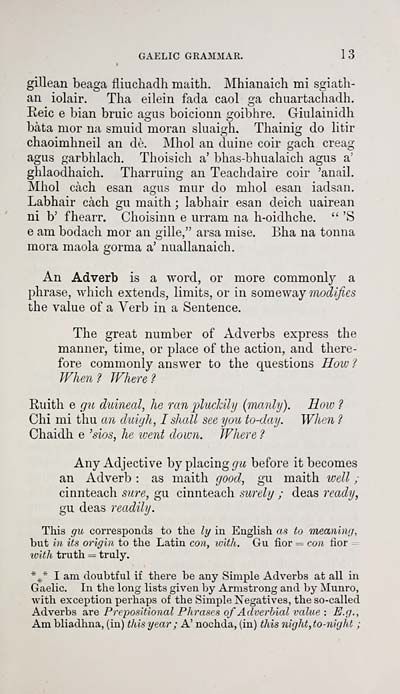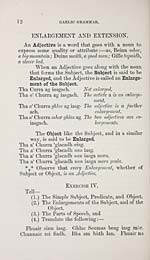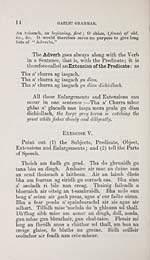Download files
Complete book:
Individual page:
Thumbnail gallery: Grid view | List view

GAELIC GRAMMAR. 13
gillean beaga fliuchadh maith. Mhianaich mi sgiatli-
an iolair. Tha eilein fada caol ga chuartachadh.
Eeic e bian bruic agus boicionn goibhre. Giulainidh
bata mor na smuid moran sluaigh. Thainig do litir
chaoimhneil an de. ]\Ihol an duine coir gach creag
agus garblilach. Tlioisich a' blias-bhualaich agus a'
ghlaodiiaich. Tliarruing an Teachdaire coir 'anail.
Mhol each esan agus mur do mhol esan iadsan.
Labhair each gu maith ; labhair esan deich uairean
ni b' fhearr. Choisinn e uiTam na h-oidhche. " 'S
e am bodacli mor an gille," arsa mise. Bha na tonna
mora maola gorma a' nuallanaich.
An Adverb is a word, or more commonly a
phrase, whicli extends, limits, or in someway modifies
the value of a Verb in a Sentence.
The great number of Adverbs express the
manner, time, or place of the action, and there-
fore commonly answer to the questions How .<*
When? Where?
Ruith e gn duineal, he ran j^lucJcily (manly). How ?
Chi mi thu an duiyh, I shall see you to-day. When ?
Chaidh e 'sios, he ivent down. Where ?
Any Adjective by placing gu before it becomes
an Adverb : as maith good, gu maith well ;
cinnteach sure, gu cinnteach surely ; deas ready,
gu deas readily.
This gu corresponds to the ly iu English as to meanimj,
but in its origin to the Latin con, with. Gu fior = con fior -
ivith truth = truly.
*^* I am doubtful if there be any Simple Adverbs at all in
Gaelic. In the long lists given by Armstrong and by Munro,
with exception perhaps of the Simple Negatives, the so-called
Adverbs are Prepositional Phrases of Adverbial value : E.g.,
Am bliadhna, (in) this year ; A' nochda, (in) this night, to-night ;
gillean beaga fliuchadh maith. Mhianaich mi sgiatli-
an iolair. Tha eilein fada caol ga chuartachadh.
Eeic e bian bruic agus boicionn goibhre. Giulainidh
bata mor na smuid moran sluaigh. Thainig do litir
chaoimhneil an de. ]\Ihol an duine coir gach creag
agus garblilach. Tlioisich a' blias-bhualaich agus a'
ghlaodiiaich. Tliarruing an Teachdaire coir 'anail.
Mhol each esan agus mur do mhol esan iadsan.
Labhair each gu maith ; labhair esan deich uairean
ni b' fhearr. Choisinn e uiTam na h-oidhche. " 'S
e am bodacli mor an gille," arsa mise. Bha na tonna
mora maola gorma a' nuallanaich.
An Adverb is a word, or more commonly a
phrase, whicli extends, limits, or in someway modifies
the value of a Verb in a Sentence.
The great number of Adverbs express the
manner, time, or place of the action, and there-
fore commonly answer to the questions How .<*
When? Where?
Ruith e gn duineal, he ran j^lucJcily (manly). How ?
Chi mi thu an duiyh, I shall see you to-day. When ?
Chaidh e 'sios, he ivent down. Where ?
Any Adjective by placing gu before it becomes
an Adverb : as maith good, gu maith well ;
cinnteach sure, gu cinnteach surely ; deas ready,
gu deas readily.
This gu corresponds to the ly iu English as to meanimj,
but in its origin to the Latin con, with. Gu fior = con fior -
ivith truth = truly.
*^* I am doubtful if there be any Simple Adverbs at all in
Gaelic. In the long lists given by Armstrong and by Munro,
with exception perhaps of the Simple Negatives, the so-called
Adverbs are Prepositional Phrases of Adverbial value : E.g.,
Am bliadhna, (in) this year ; A' nochda, (in) this night, to-night ;
Set display mode to: Large image | Transcription
Images and transcriptions on this page, including medium image downloads, may be used under the Creative Commons Attribution 4.0 International Licence unless otherwise stated. ![]()
| Early Gaelic Book Collections > Blair Collection > Gaelic texts for schools > (15) |
|---|
| Permanent URL | https://digital.nls.uk/79350563 |
|---|
| Description | A selection of books from a collection of more than 500 titles, mostly on religious and literary topics. Also includes some material dealing with other Celtic languages and societies. Collection created towards the end of the 19th century by Lady Evelyn Stewart Murray. |
|---|
| Description | Selected items from five 'Special and Named Printed Collections'. Includes books in Gaelic and other Celtic languages, works about the Gaels, their languages, literature, culture and history. |
|---|

